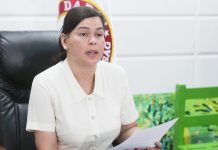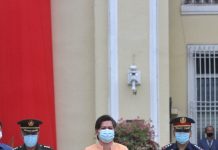The planned 12-year basic education cycle is ideal but is unrealistic under the present conditions of the country’s existing educational
facilities and implementing it at this time will only drive more
youths to drop out of school.
According to Davao City Rep. Karlo Alexei Nograles, the spirit and intent of the 12-year basic education as proposed by the Department of Education (DedEd) is very laudable as it increases the competence of those who completed basic education but cannot go to college,
therefore increasing their chance for job placements.
However, Nograles said that the government’s present public school system does not have enough classrooms, teachers and well-equipped research and educational facilities which are required for the effective implementation of the DepEd proposal.
North Cotabato Governor Lala Talino-Mendoza voiced the same position as she pointed out that there are things that needs to be done first, such as hiring more teachers and re-tooling them to be more competent and acquire certain core competencies to cope with the demands of a 12-year basic education cycle.
“Teaching an entirely new curriculum that is tuned to the proposal of the DepEd requires additional training for our teachers apart from the fact that we have to hire more teachers to cope with the 12-year basic education cycle. It’s not a simple matter of laying down a new curriculum and implementing it without equipping our teachers the appropriate training because they might not have the knowledge and
skills that are required by the proposal,” Mendoza said.
“Im not entirely against the proposal but there are things that needs to be done first even in the local government levels so that we can
properly implement this plan,” Mendoza said.
Governor Mendoza bared that starting next year, the North Cotabato provincial government will launch a massive special training program for the province’s public school teachers so that they can be prepared for DepEd’s proposal.
“ The proposal might need to wait for another one or two years before we can be ready for a 12-year basic education cycle,” Mendoza said.
Nograles noted that the country’s public school system is too ill-equipped and undermanned to meet the requirement of a 12-year
cycle of basic education.
“The reality on the ground is that some schools even have to divide their classes to morning and afternoon sessions to accommodate more students. In some places, classes are still being held under the trees or have to mix students from different levels just to accommodate all of them in one class. We need to modernize our public school system first before we could even consider expanding the cycle of our basic education system,” Nograles pointed out.
This plan is ideal but unrealistic and perhaps a misplaced priority
at this time.. In an ideal world, the proposed 12-year basic education
is a very good idea. However, we must first address more immediate
concerns like the lack of school buildings, textbooks, classrooms,
laboratory equipment, computers and many other things. We don’t even
have enough teachers to cover our present 10-year basic education
cycle because many of them have gone abroad to work as caregivers!
Nograles said.
Nograles said that once the government has fully modernized the
country’s public school system and has adequately addressed all
shortage problems including the lack of teachers, the DECS can pursue
its 12-year basic education plan.
In the meantime, let’s keep our eyes on the ball and focus on what’s
needed to be accomplished first. Once we are assured that there are no
longer classrooms under the trees, then we are ready to have a 12-year
basic education cycle,” Nograles said.






